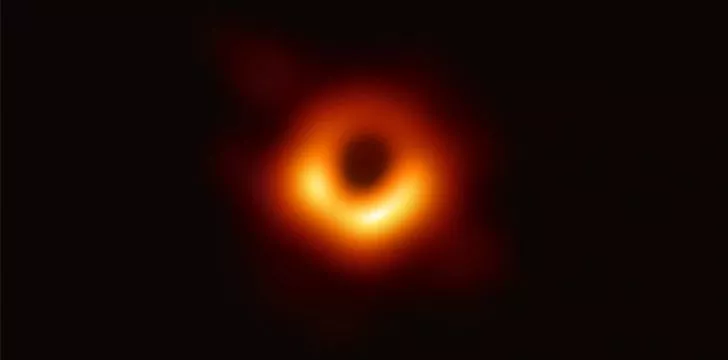Type “what happens if a person goes” into Google and you will see this question auto-complete right there as the top hit.
Wondering about this cosmic phenomenon is clearly keeping folks awake at night – it’s time to put it to bed.
What even is a black hole?
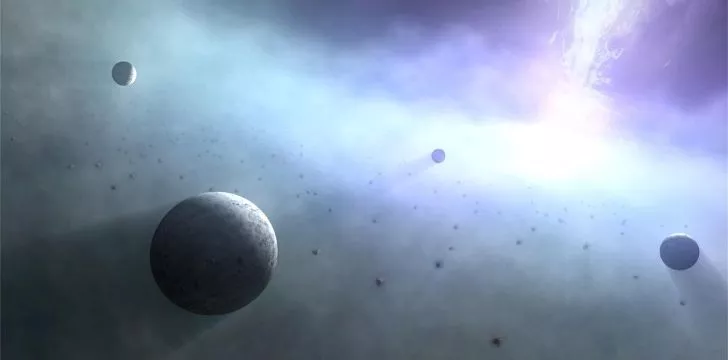
You’ve definitely heard of them – you know they’re a dark, powerful enigma of deep space, but do you actually know what they are and how they work?
Black holes are places in space where the gravity is so immensely strong, due to the massive amount of matter squeezed into them relative to their size, that nothing can escape its pull.
Not planets, not stars, and not even electromagnetic radiation such as light.
Because no light can escape, black holes cannot be seen – they are invisible, appearing black against the background of space.
The only way scientists know of their existence is by using specialized telescopes to observe the behavior of stars and gas surrounding them, and how their behavior changes as their distance from the black hole vary.
Are there different types?
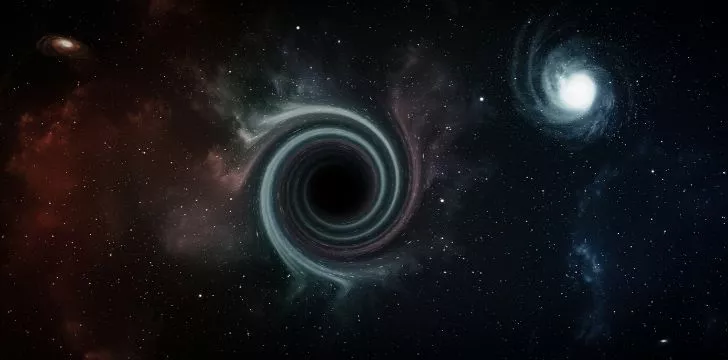
There are indeed a few types of black holes – the smallest are as minuscule as just one atom however, they contain the mass of a large mountain.
Putting that into perspective: a droplet of water contains 2,000,000,000,000,000,000,000 (two sextillions) atoms of oxygen, and twice that many of hydrogen.
Imagine that number of large mountains squashed into the size of a droplet of water… that’s dense!
There are also “stellar” black holes, which are much larger, and form when the center of very big stars die and collapse in on themselves.
The largest black holes are referred to as “supermassive”, and their cool name is definitely deserved.
These black holes have masses that are equal to more than a million of our sun put together and are found at the center of galaxies.
You may be familiar with the shape of our galaxy, the Milky Way; it looks like a spiral spinning around a central core – and there’s a reason for this.
Our galaxy, like every other galaxy, is orbiting around a supermassive black hole, the spiral appearing tighter in the center due to the higher gravitational pull these stars are experiencing relative to stars at a further distance.
You’ll be pleased to know our solar system sits firmly in the latter category!
So what happens if a person goes into a black hole?
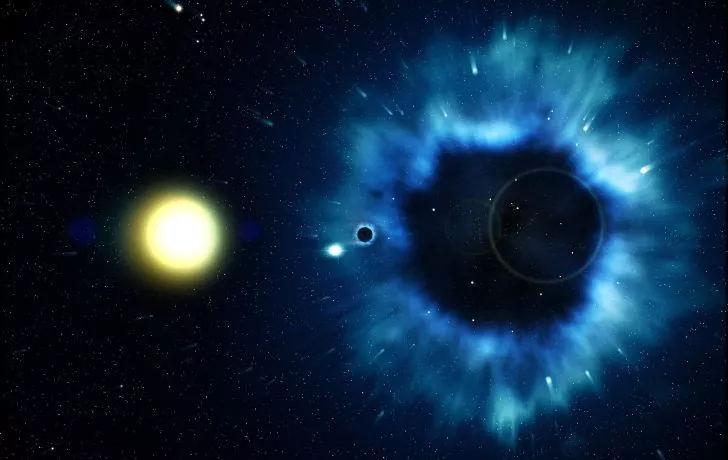
Ah, the burning question – hang on to your space helmets because it’s about to get bizarre!
Remember I told you black holes had an exceptionally strong gravitational pull?
Legendary scientist Albert Einstein determined that gravity, if strong enough, can warp space and time as we know it and cause it to curve.
Therefore, if an object is dense enough (think of all the mountains in the single water droplet!), it can literally curve in on itself and burrow a hole right into the fabric of space.
The deeper you go into the burrow, the more warped and mangled it gets until you reach the “singularity”.
This is the point where the curving of space and time becomes infinite; space and time as concepts become meaningless, and the laws of physics, which rely on space and time to be constant, no longer apply.
So, if someone were to go into a black hole, reality would sort of… split.
Hawkin’s and Einsteins theories.
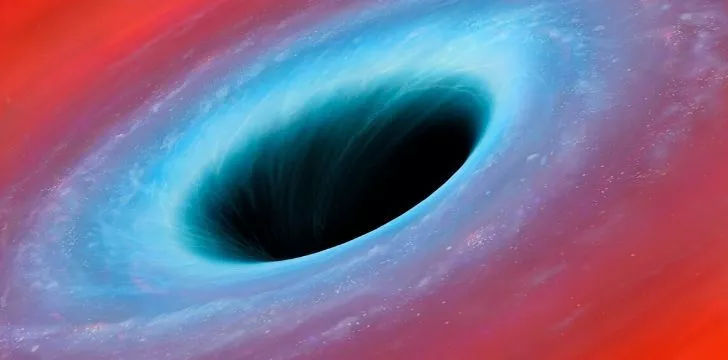
There are a few theoretical possibilities, and what would happen also depends on your viewpoint – are you the one falling in, or are you a spectator?
Both views would be different, but both are scientifically correct, and happen simultaneously.
Yup. I told you it was freaky. Let’s unpack this a little further.
Let’s say you’re the one falling in – it all starts with the “event horizon”.
This is the theoretical edge of a black hole where its gravitational force precisely counteracts the effort of light to escape it.
Once you’re past the event horizon, there’s no coming out.
There are two possibilities here: you fall past the event horizon completely unscathed, or you get sizzled into a scorched shadow of space ash by Hawking radiation.
Thermal radiation is emitted by black holes at the event horizon due to quantum effects and is named for the famous physicist Stephen Hawking who correctly predicted its existence.
According to Einstein’s Theory of General Relativity, the first possibility would happen – you would softly sail past the event horizon into the black hole without so much as a bump or burn.
This is because you’re technically in freefall, and in freefall, you feel no gravity – and live out the rest of your natural-born life quite peacefully – until you ran out of life support that is, or approached the singularity.
This is because, as you get closer to the singularity, gravity becomes noticeably stronger.
Assuming you were falling feet first, your feet would be subject to a stronger gravitational force before your head would be, and would stretch you out until your molecules simply tore apart.
Not a very pleasant ending, but scientists do have a brilliant term for this effect – “spaghettification”.
Someone watching you would never actually be able to see you cross over the event horizon because once you’re past it, the light you reflect could no longer escape from past it.
What they would see in theory, however, would be you falling slower and slower toward the event horizon and turning red.
This is because the closer you get, the light would get bent toward the infrared end of the electromagnetic spectrum, and the tougher and tougher it is for it to escape the black hole’s gravity.
But technically, this is irrelevant – what needs to happen in order to not break the laws of quantum physics, is for you to stay on the outside of the black hole.
This is because these laws state that information cannot be lost – even if this means you being burnt to a crisp!
Which reality is true then?

Here’s the truth – scientists have been grappling with the nature of black holes for years and cannot decide, as to define either reality as the truth would break one of the scientific laws we take as fact.
Physicists refer to this conundrum as the “Black Hole Information Paradox”.
A number of resolutions have been proposed, but each one throws up more quandaries than it answers.
Ugh, mind-boggling.
So I know what you’re thinking… should I be worried about all this? Could a black hole suddenly appear and swallow up the Earth?
Well let me put your mind at rest. Black holes do not whizz around space, wreaking havoc and gobbling up space matter.
Earth could not be sucked into a black hole because there is not a black hole near enough our solar system for that to happen.
“But what about if our sun collapsed and made a black hole!” I hear you cry. Our sun will never turn into a black hole, simply because it is not a big enough star to do so.
Even if it did, the gravity of the black hole formed would be the same as our sun, and the Earth just like every other planet in our solar system would continue to orbit it exactly as we do now.
Phew!
In Conclusion
Science writer Amanda Gefter wrote, “That’s the thing about black holes. They’re not just annoying obstacles for space travelers.”
“They’re also theoretical laboratories that take the subtlest quirks in the laws of physics, then amplify them to such proportions that they can’t be ignored.”
Forget about what effects falling into a black hole in deep space would have on you, their real effect on humanity happens much closer to home – how they make us question what we know about the nature of our reality.

